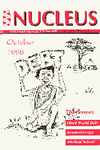Deadly doctors
However, Newcastle GP Dr David Moor was charged this September with murdering one of his patients.[2] The trial begins in Newcastle Crown Court on 19 October. This followed Dr Moor's admission in July 1997 that he had helped 'a large number' of patients to die during his 30 year career.[3] At the same time Dr Michael Irwin, chairman of the Voluntary Euthanasia Society and retired Sussex GP, told the Sunday Times that he had administered fatal doses of drugs to around 50 patients. Sussex Police have investigated Dr Irwin but have not charged him.
The first legal case of physician-assisted suicide (PAS) took place this April in Oregon, USA. An 85 year-old woman with metastatic breast cancer was prescribed a lethal dose of barbiturates, which she took with brandy, dying 30 minutes later.[4] Oregon is the only US state that has passed such laws. However, the Federal Drug Enforcement Administration warned that doctors who prescribe pills for suicide would risk sanctions. In addition, the American Medical Association, American Nursing Association and the National Hospice Organisation have filed briefs with the Supreme Court opposing PAS. It is interesting that Oregon has not seen the expected stampede of terminally ill people demanding PAS. Perhaps this shows that public support for euthanasia is not as widespread as some proponents suggest.
Bishops rule
Closer to home, Anglican bishops debated issues at the end of life at the Lambeth Conference this August. They defined euthanasia as the act by which 'one person intentionally causes or assists in causing the death of another who is terminally ill in order to end the other's pain and suffering'.[5] Their resolution states that euthanasia 'is neither compatible with the Christian faith nor should be permitted in civil legislation'. However, they went on to distinguish euthanasia from withholding, withdrawing, declining or terminating excessive medical treatment. Some delegates were dismayed that the conference appeared to be endorsing the withdrawal of food or fluids. The Archbishop of South East Asia, the Most Rev Moses Tay, a doctor, said 'giving food and drink is Asian culture and to withhold it would violate our consciences.' The director of CARE (Christian Action Research and Education) raised similar concerns.
The BMA is seeking views on all aspects of withdrawing and withholding life-prolonging medical treatment.[6] A consultation document aims to stimulate debate and invites comment on specific questions. It is available on the internet[7] and from the BMA's medical ethics department.
As discussed in previous Nucleus articles,[8,9] euthanasia is not compatible with God's revealed laws. Scripture tells us that we are not to take human life (Ex 20:13; Gn 9:5-6). As Christian medics we are responsible before God for the patients in our care (Lv 19:16).
'Back Door' euthanasia
Following the House of Lords Select Committee's ruling in 1994, the 'front door' to legal active euthanasia (the administration of a lethal injection) appears to be shut, at least for the meantime. However, there is a possibility that euthanasia may be introduced through the 'back door' of withholding or withdrawing treatments. When this is done with the intention of ending a patient's life it is termed by some as 'passive' euthanasia. Many ethicists feel this is more acceptable than giving a lethal injection.
It's the thought that counts
However, dividing euthanasia into active and passive forms is not helpful. In some cases withholding or withdrawing treatment is euthanasia while in others it is good medical practice. The dividing line is the intention behind the act or omission. In euthanasia the intention is to kill; in good medical practice it is to maximise the quality of life experienced by the patient. Thus a better definition of euthanasia is that used by HOPE (Healthcare Opposed to Euthanasia): 'the intentional killing by act or omission of a person whose life is felt not to be worth living'.
This definition acknowledges that it is not necessary to do everything technologically possible to prolong life. Withholding or withdrawing useless treatments is good medical practice. It is not euthanasia, as the intention is not to kill but rather to maximise quality of life. Consultation with the patient (if possible), relatives and medical and nursing colleagues is desirable before such decisions are made.
By the same token it is not wrong to give high doses of painkilling drugs to patients with terminal illness, even though this may incidentally shorten life, if the intention is to control pain or other distressing symptoms. This standpoint has been accepted in British Law since the 1950s.[10]
Focusing on intention also enables us to see that PAS is an act of euthanasia. The intention of the doctor in prescribing a lethal drug is that the patient should deliberately end their life using that drug.
Conclusion
Decisions to withhold or withdraw treatments are some of the most common facing medical staff and can often be very difficult to make. All of us will make the wrong decision at times, but thinking through the issues now will help us be prepared for the future (Rom 12:2).
































